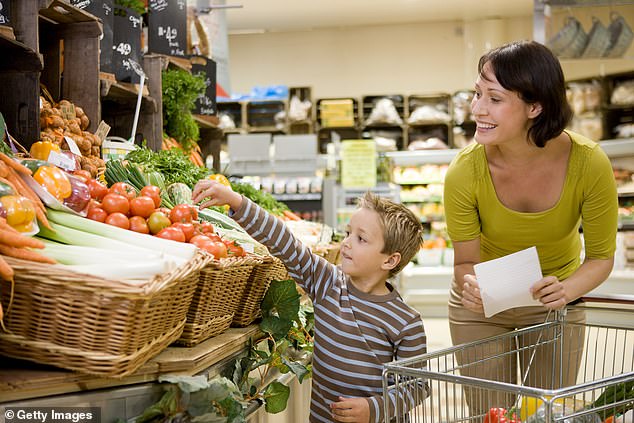Veg out! Britons are more likely to eat their five-a-day compared to EVERY other country in the world
Britain has the highest fruit and vegetable consumption in the world, with a third of adults consuming five or more portions a day.
About 33 percent meet the nutrition goal, which has been shown to reduce the risk of heart disease, stroke and some cancers.
The figure puts Britain joint top of the global rankings for fruit and vegetable consumption, level with the Republic of Ireland, followed by South Korea and Israel, both with 32 percent.
The average across the 30 countries analyzed for the Organization for Economic Co-operation and Development's 'Health at a Glance' report was just 15 percent, with Romania ranking lowest at 2 percent.
Despite Britain's relative success, experts warn the figure is still too low and are urging people to use the new year as an opportunity to increase their intake and improve their health by also becoming more active .
Britain has the highest fruit and vegetable consumption in the world, with a third of adults consuming five or more portions a day. About 33% meet the nutrition target, which has been shown to reduce the risk of heart disease, stroke and some cancers (stock photo)
The NHS recommends adults and children eat at least five portions of fruit and vegetables a day, with each portion equaling 80 grams.
This corresponds to approximately one apple, one banana, seven strawberries, two broccoli spears, two heaped tablespoons of cooked spinach, 5 cm of cucumber or seven cherry tomatoes.
One small glass – 150 ml – of 100 percent fruit juice, vegetable juice or smoothie counts as one serving. But a second glass doesn't count.
Potatoes do not count towards the target of five per day. This is the same for yams, cassava and plantain.
They are nutritionally classified as starchy foods because, when eaten as part of a meal, they are usually used in place of other starch sources, such as bread, rice or pasta.
Health Secretary Andrea Leadsom said: 'I'm delighted that across Britain more and more of us are getting our five a day.
'Whether you prefer Brussels sprouts or a tangerine, eating more fruit and vegetables is essential for a healthy, balanced diet.
'We continue to empower people to make healthier food choices by giving people access to the right advice and information, including the introduction of calorie labeling on food sold in restaurants, cafes and takeaways.
'As we enter a new year, it's a great time to boost efforts to be physically active, especially after a bit of Christmas pampering. That's why we're supporting people to keep fit with a range of fantastic free apps such as Couch to 5K and Actief 10.'
Fruits and vegetables are a good source of vitamins and minerals, including folic acid, vitamin C and potassium.

Health Secretary Andrea Leadsom, pictured at the King's coronation ceremony in May, has said: 'I'm delighted that across Britain more of us are getting our five a day'
They are also an excellent source of dietary fiber, which can help maintain a healthy gut and prevent constipation and other digestive problems.
The OECD report states: 'Regular consumption of fruit and vegetables is associated with better health outcomes – especially in lowering the risk of cardiovascular disease and certain types of cancer.
'The World Health Organization recommends eating at least 400 grams, or five or more servings, of fruit and vegetables per day.
'A healthy diet can also reduce the risk of being overweight or obese.
'In 2019, diets low in fruits, vegetables and legumes were responsible for an estimated total of 2.7 million deaths worldwide.'
Rebecca Tobi, senior engagement manager at the Food Foundation, said: 'While it is encouraging to see that Britain is performing well when it comes to fruit and vegetable consumption compared to other OECD countries, there is still a long way to go to leave before we can actually eat. as much fruit and vegetables as is necessary for our good health.
'One in three adults currently meets the recommendation of five a day, but the proportion of people eating little to no vegetables has increased in both adults and young children over the past decade.
'Almost a third (29 percent) of primary school-age children eat less than one portion of vegetables per day.

The figure puts the UK joint top of the global rankings for fruit and vegetable consumption, level with Ireland, followed by South Korea and Israel, both at 32% (stock photo)
'We also know that poorer households eat far less fruit and vegetables than richer households – the poorest 20 per cent of households eat on average one portion less of vegetables per day
'This is really worrying as the cost of living crisis is only exacerbating this situation.
'The amount of vegetables bought by UK households has fallen by 14 per cent in the period to 2022 – the lowest level in 50 years – as tight food budgets forced households to prioritize cheaper, less healthy calories over fruit and vegetables.
'Some companies such as Sainsbury's and Greggs have made a 'vegetarian pledge' to help Britain eat more as part of the Peas Please program and are making good progress, but both companies and the government must do more to ensure that everyone has access to and can afford enough fruit and vegetables.'
- Apple sales are under pressure as the country cuts back on fresh food due to pressure on living costs. The number of apples sold in shopping streets fell by 7.5 percent this year. The data comes from The Grocer magazine, which said an average 4.4 percent price increase on apples was putting off shoppers.
